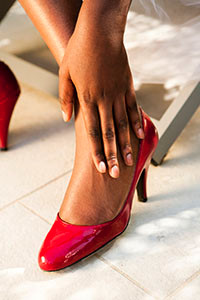Garner (919) 661-4150
Where Is Pain from Cuboid Syndrome Located?
Monday, 20 May 2019 00:00 If you experience pain and discomfort on the outside of the foot, you may have what is known as cuboid syndrome. The cuboid bone is a portion of the joint that promotes mobility. This foot condition can develop when the cuboid bone moves from its normal position, and this can cause difficulty in standing or walking. Professional ballet dancers may notice this uncomfortable sensation on the outside of their foot, in addition to people who have inversion ankle sprains. Possible causes for this condition to develop includes jumping onto a hard surface, or from wearing shoes that do not fit properly. The symptoms that are associated with cuboid syndrome often include the inability to walk, moderate swelling on the outside of the foot, and the pain may extend to the sole of the foot. If you feel you have developed cuboid syndrome, it is suggested to consult with a podiatrist who can guide you toward proper treatment techniques.
If you experience pain and discomfort on the outside of the foot, you may have what is known as cuboid syndrome. The cuboid bone is a portion of the joint that promotes mobility. This foot condition can develop when the cuboid bone moves from its normal position, and this can cause difficulty in standing or walking. Professional ballet dancers may notice this uncomfortable sensation on the outside of their foot, in addition to people who have inversion ankle sprains. Possible causes for this condition to develop includes jumping onto a hard surface, or from wearing shoes that do not fit properly. The symptoms that are associated with cuboid syndrome often include the inability to walk, moderate swelling on the outside of the foot, and the pain may extend to the sole of the foot. If you feel you have developed cuboid syndrome, it is suggested to consult with a podiatrist who can guide you toward proper treatment techniques.
Cuboid syndrome, also known as cuboid subluxation, occurs when the joints and ligaments near the cuboid bone in the foot become torn. If you have cuboid syndrome, consult with Chukwuma Ukata, DPM from Advanced Carolina Foot and Ankle Center. Our doctor will assess your condition and provide you with quality foot and ankle treatment.
Cuboid syndrome is a common cause of lateral foot pain, which is pain on the outside of the foot. The condition may happen suddenly due to an ankle sprain, or it may develop slowly overtime from repetitive tension through the bone and surrounding structures.
Causes
The most common causes of cuboid syndrome include:
- Injury – The most common cause of this ailment is an ankle sprain.
- Repetitive Strain – Tension placed through the peroneus longus muscle from repetitive activities such as jumping and running may cause excessive traction on the bone causing it to sublux.
- Altered Foot Biomechanics – Most people suffering from cuboid subluxation have flat feet.
Symptoms
A common symptom of cuboid syndrome is pain along the outside of the foot which can be felt in the ankle and toes. This pain may create walking difficulties and may cause those with the condition to walk with a limp.
Diagnosis
Diagnosis of cuboid syndrome is often difficult, and it is often misdiagnosed. X-rays, MRIs and CT scans often fail to properly show the cuboid subluxation. Although there isn’t a specific test used to diagnose cuboid syndrome, your podiatrist will usually check if pain is felt while pressing firmly on the cuboid bone of your foot.
Treatment
Just as the range of causes varies widely, so do treatments. Some more common treatments are ice therapy, rest, exercise, taping, and orthotics.
If you have any questions, please feel free to contact our office located in Garner, NC . We offer the newest diagnostic and treatment technologies for all your foot care needs.






